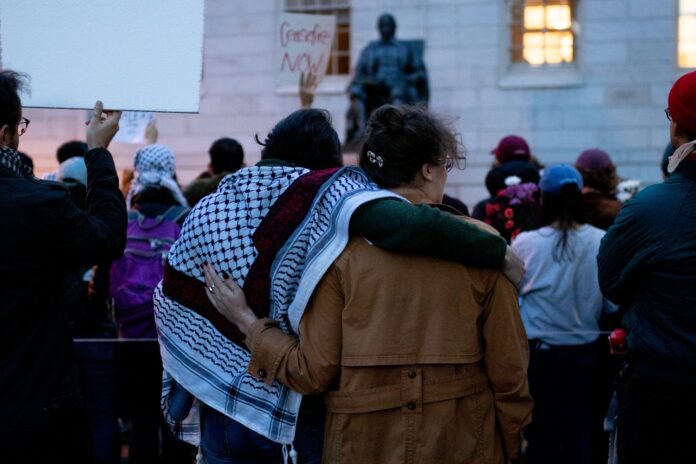By Angelina Tang
As the conflict between Palestine and Israel continues in the Gaza Strip, tensions between student organizations on college campuses back home have erupted across the United States. School administrators have subsequently been cracking down on such activities to avoid violence and backlash.
A prime example would be Harvard University, where the Undergraduate Palestine Solidarity Committee (PSC) released a controversial statement a month ago declaring that Israel was “entirely responsible for all the unfolding violence.” This statement was signed by 33 other student organizations, and it received national backslash by professors, politicians, House of Representative lawmakers, and former Harvard president, Lawrence H. Summers, to name a few. Summers in particular stated that it made him feel “disillusioned and alienated.”
The PSC made a follow-up declaring that they “staunchly oppose violence against civilians,” and that “the statement aims to contextualize the apartheid and colonial system while explicitly lamenting ‘the devastating and rising civilian toll’ in its caption.” However, that did not soften the arguments made against it, and some student organizations began revoking their signatures, including the Undergraduate Nepali Student Association, who stated that they did not wish for their support of calling attention to “historical injustices against Palestinians” to be misinterpreted as support for violence against Israel. The statement has since removed the names of the students and organizations in support of it from public view, but some students have already been doxxed, and CEOs of a number of companies, spearheaded by hedge fund manager Bill Ackman, have called for names of students in the signing student organizations to be made public, blacklisting them from employment.
Since then, the PSC has taken a quieter approach to educating students about the history of Israeli-Palestinian history, while smaller organizations like the African and African American Resistance Organization (who do not yet have official recognition from the university) have taken up authority in hosting a pro-Palestinian “week of action,” holding two rallies, a protest sign-making events, and class interruptions.
Another intense example would be The University of Pennsylvania, particularly because president Liz Magill has resigned as a result of the conflict. Even prior to the October 7th Hamas attack on Israel, UPenn was under scrutiny as they held a Palestine Writes Literature Festival in late September, inviting speakers who had a history of making anti-semitic statements. Following the Hamas attack, student organizations Penn Against the Occupation and Philly Palestine Coalition projected light messages on the walls of buildings to express their pro-Palestine sentiment and discontentment with the UPenn administration’s support of Israel. Such messages included “From the river to the sea, Palestine will be free,” “Penn funds Palestinian genocide,” and “Liz Magill is complicit in genocide.” Magill acknowledged these messages and called them anti-semitist, causing “pain and fear for our Jewish community.”
In addition, rallies and protests by community members and students alike took place on the UPenn campus. There were also multiple instances of blatant anti-semitist sentiment, including a spray-painted swastika, graffiti in a vacant apartment, and vandalism of the Penn Hillel, the University’s Jewish center. Due to these events, UPenn was one of several U.S. universities who had complaints filed against them by Brandeis Center, a national Jewish advocacy organization, to the Office of Civil Rights of the U.S. Department of Education. The other universities included Harvard and MIT, among others, and they were all collectively deemed to have been complicit in allowing anti-semitism to perpetrate their campuses. As such, Harvard, MIT, and UPenn were invited to a special committee hearing with the House Committee on Education and Workforce regarding anti-semitism in higher education on December 5th.
It was at this hearing that Magill made a blunder in a response to a question posed to her by Rep. Elise Stefanik of New York. Stefanik asked if students making anti-semitic statements at UPenn were subject to punishment due to violation of school policy. Magill hesitated before replying, “If the speech turns into conduct, it can be harassment.” In other words, free speech was permitted, while only direct action or attacks against Jewish students would be penalized. Stefanik immediately tore into Magill’s response, saying that the question should’ve had an easy “yes” for an answer. Magill later explained that she’d been thinking about the idea of maintaining freedom of speech as per the U.S. Constitutional values and that she would like to amend her previous answer into an affirmative, but the damage had already been done. Community members, Pennsylvania’s state governor, UPenn administration and Jewish UPenn students all began loudly voicing their disapproval of Magill condoning anti-semitic speech. Magill announced her resignation on December 9th.
As the Israel-Palestine conflict continues and students persist in protest across the country, the response of college administrators is currently taking the limelight of U.S. politics regarding the war. As the weeks progress, we have seen more and more administrative action and restriction against students’ demonstrations, and it is likely that more of that will spread in the coming month.










